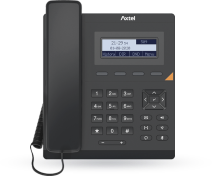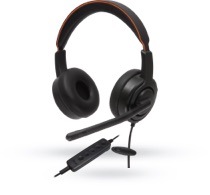VOIP phones
Ensure professional call quality – choose a VOIP phone from the Axtel product range. Connect with your clients over the internet using modern devices from a trusted manufacturer. Each Axtel VOIP phone has been designed with the highest precision to facilitate business conversations even in the most challenging office conditions. Choose the best VOIP phone for yourself and check out the available models.
VoIP, or Voice over Internet Protocol, also known as IP phones, allows voice transmission over the internet. Unlike traditional phone calls where the signal is transmitted over phone lines, VoIP transmits voice over the internet network.
There are many different ways VoIP can be used. It can be a simple system for transmitting calls between two users, or it can be a complex tool for managing multiple users in a company. Depending on the needs, different features and settings can be selected to provide the appropriate solutions.
Compared to traditional phone calls, VOIP phones offer many advantages. Firstly, it is usually much cheaper, especially when calling abroad. Secondly, it is more flexible because calls can be made from various devices such as smartphones, tablets or computers. Thirdly, it offers many features such as file sharing, video calls and many more.
In summary, VoIP is an innovative technology that offers many benefits compared to traditional phone calls. This allows you to get high-quality calls at a much lower price, with greater flexibility and more advanced features.
Axtel VoIP phones
Our phones stand out with the plug&play feature, which means that installation is extremely easy and does not require additional drivers. Additionally, the built-in conference function for up to five people allows for quick and convenient meetings without the need for external systems. It is also worth noting that our phones offer EHS support, up to 12 SIP lines, and provide excellent HD sound quality. All of these features confirm that our products are among the highest quality on the market.
How do VoIP phones work? VoIP is a technology that allows voice transmission over the Internet instead of traditional telephone infrastructure. As a result, users can make phone calls using the internet, which offers a range of benefits compared to traditional methods of making phone calls.
During a VoIP call, the voice is converted into a digital signal and then sent as packets of data over the internet to the recipient. This signal can be transmitted through various types of connections, such as internet cables, Wi-Fi, satellites, or DSL connections. In the case of traditional phone calls, the signal is transmitted over the telephone line.
To use VoIP, an internet connection and an endpoint device such as a computer or VoIP phone are required. There are many different applications for IP phones, with the most common being used in office buildings, call centers, or helplines. This is because of the lower cost of calls and the ability to easily select accessories. For example, call center headsets cannot be too small or too large as they are used by the employee for about 8 hours a day.
One of the main advantages of VoIP is the lower cost of calls, especially for international calls. Additionally, compared to traditional phone calls, VoIP offers greater flexibility and ease of use. Users can make calls from various devices, such as computers, smartphones, tablets, and also use additional features, such as video calls or file sharing.
As technology advances, more and more companies are using VoIP systems instead of traditional phones. This allows them to reduce call costs, improve efficiency and flexibility, and also provide better quality services to their customers. However, the key issue with VoIP is ensuring stable and high-quality connections, which may require appropriate internet access and choosing the right service provider.
How do voip phones work?
VoIP is a technology that allows voice communication to be transmitted over the Internet instead of traditional telephone infrastructure. With VoIP, users can make phone calls using the internet network, offering several advantages compared to traditional telephone methods.
During a VoIP call, voice is transformed into digital signals and then sent in the form of data packets over the internet network to the recipient. This signal can be transmitted through various types of connections, such as internet cables, Wi-Fi, satellites, or DSL links. In the case of traditional telephone calls, the signal is transmitted over the phone line.
To use VoIP, you need an internet connection and an end device, such as a computer or a VoIP phone. There are many different applications for IP phones, commonly used in offices, call centers, or helplines. This is due to the lower cost of calls and the ease of selecting accessories. For example, call center headsets cannot be too small or too large as they are used by employees for approximately 8 hours a day.
One of the main advantages of VoIP is the lower cost of calls, especially for international calls. Furthermore, compared to traditional telephone calls, VoIP offers greater flexibility and ease of use. Users can make calls from various devices such as computers, smartphones, tablets, and also utilize additional features such as video calls or file sharing.
With advancing technology, more and more companies are adopting VoIP systems instead of traditional telephones. This allows them to reduce call costs, improve efficiency and flexibility, and provide better service quality to their customers. However, ensuring a stable and high-quality connection is crucial for VoIP, which may require adequate internet access and choosing the right service provider.
VoIP desk phones
A VoIP desk phone works in the same way as a traditional desk phone, except it uses an internet connection instead of a phone line. The VoIP desk phone uses the internet to transmit voice signals.
Interestingly, our phones are fully compatible with wireless headsets, allowing us to use the desk phone freely, even up to 400 meters away.
A VoIP desk phone typically comes equipped with features such as call forwarding, automatic voicemail, call blocking, and many others. Additionally, it often offers features that are not available on traditional phones, such as the ability to conduct video calls.
The main advantage of VoIP desk phones is lower call costs, especially for international calls. This allows both businesses and individual customers to save significant amounts of money on their phone bills. Additionally, compared to traditional desk phones, VoIP desk phones offer better call quality and greater flexibility. It’s possible to make calls from various devices, such as phones, tablets, and even computers, as well as share files, conduct video conferences, and much more.
It’s worth noting that for a VoIP desk phone to function properly, a fast and stable internet connection and appropriate end devices are required. Additionally, selecting the right VoIP service provider can be crucial for call quality and reliability. To achieve the best results, it’s worth consulting with professional providers and technicians who can help choose the best solution for individual needs.




